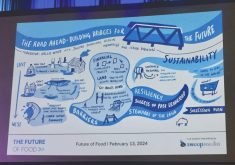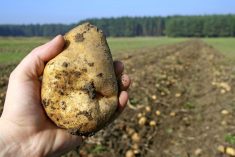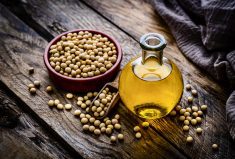Reuters – Louis Dreyfus Company has reported that its first-half net profits and sales have fallen compared to a last year, when markets were boosted by upheaval from the war in Ukraine.
One of the world’s largest crop merchants, its rivals include Archer-Daniels-Midland, Bunge and Cargill. The company reported a group net profit of US$568 million on Oct. 2 for the first half of 2023, against $662 million in the year-earlier period.
Net sales fell to $25.8 billion from $30.3 billion, reflecting a decline in prices as well as a 4.7 per cent year-on-year decrease in volumes shipped.
Read Also

Innovation takes centre stage at record-breaking Ag Expo
Lethbridge event hits capacity with 326 global exhibitors showcasing the latest ag tech, innovation and the 129th North American Seed Fair.
Volatility in most of its markets eased compared with the previous year, while prices fell, with the exception of robusta coffee, sugar, rice and citrus juices, according to a financial report from the company.
Uncertainty fuelled by Russia’s invasion of fellow grain exporter Ukraine buoyed profits for crop merchants last year as they used global networks to manage supply disruptions and meet firm food demand.
ADM and Bunge have also reported a drop in second-quarter profits from record year-earlier levels. A bumper Brazilian soybean harvest, however, is supporting processing margins and led those companies to raise their full-year earnings guidance.
Louis Dreyfus similarly cited big Brazilian soy and corn crops, plus strong Chinese demand, as driving performance in its first-half grain and oilseed business.
In a planned move, it stopped exporting Russian grain as of July 1 and continues to study options to transfer its Russian business and grain assets to new owners, it said.
The group recorded, as of June 30, $32 million in assets and $5 million in liabilities for sale in Russia, it added.
War disruption increased transport costs in Ukraine. Total assets and liabilities in that country as of June 30 were reported at $152 million and $125 million, respectively.
Louis Dreyfus said its cotton business used multiple origins to maintain profits in the face of lower volumes linked to inflation pressures on consumers.
Its sugar business, excluding the divested Imperial Sugar in the United States, improved as it successfully hedged against high volatility.
Operating profit from rice remained strong, despite weakening global demand.
Louis Dreyfus is majority-owned by Margarita Louis-Dreyfus via family trust Akira. The rest of the capital is controlled by Abu Dhabi holding firm ADQ, whose entry two years ago helped to resolve tensions over debt and family minorities.
It paid a $503 million dividend to shareholders during the first half.















